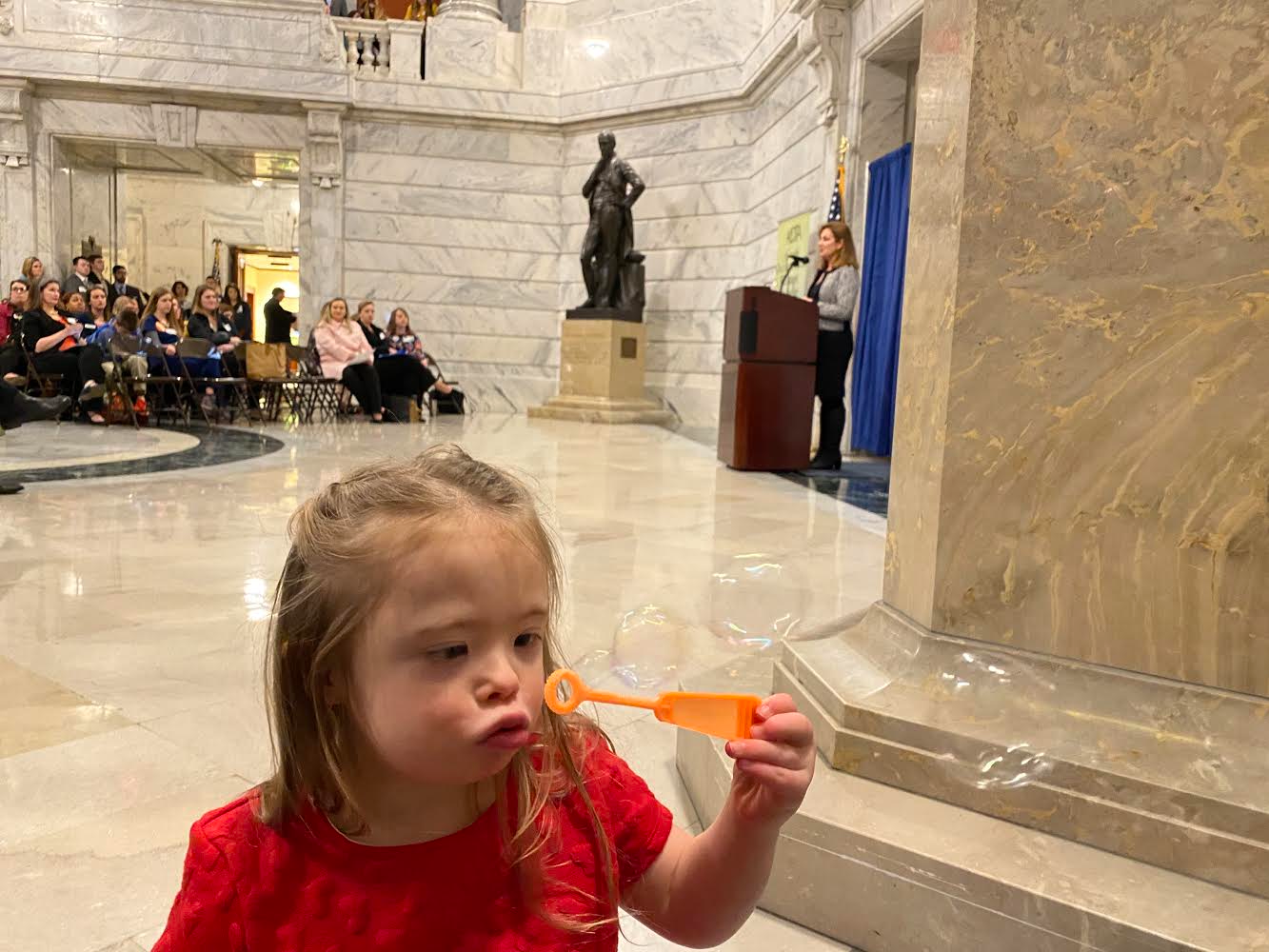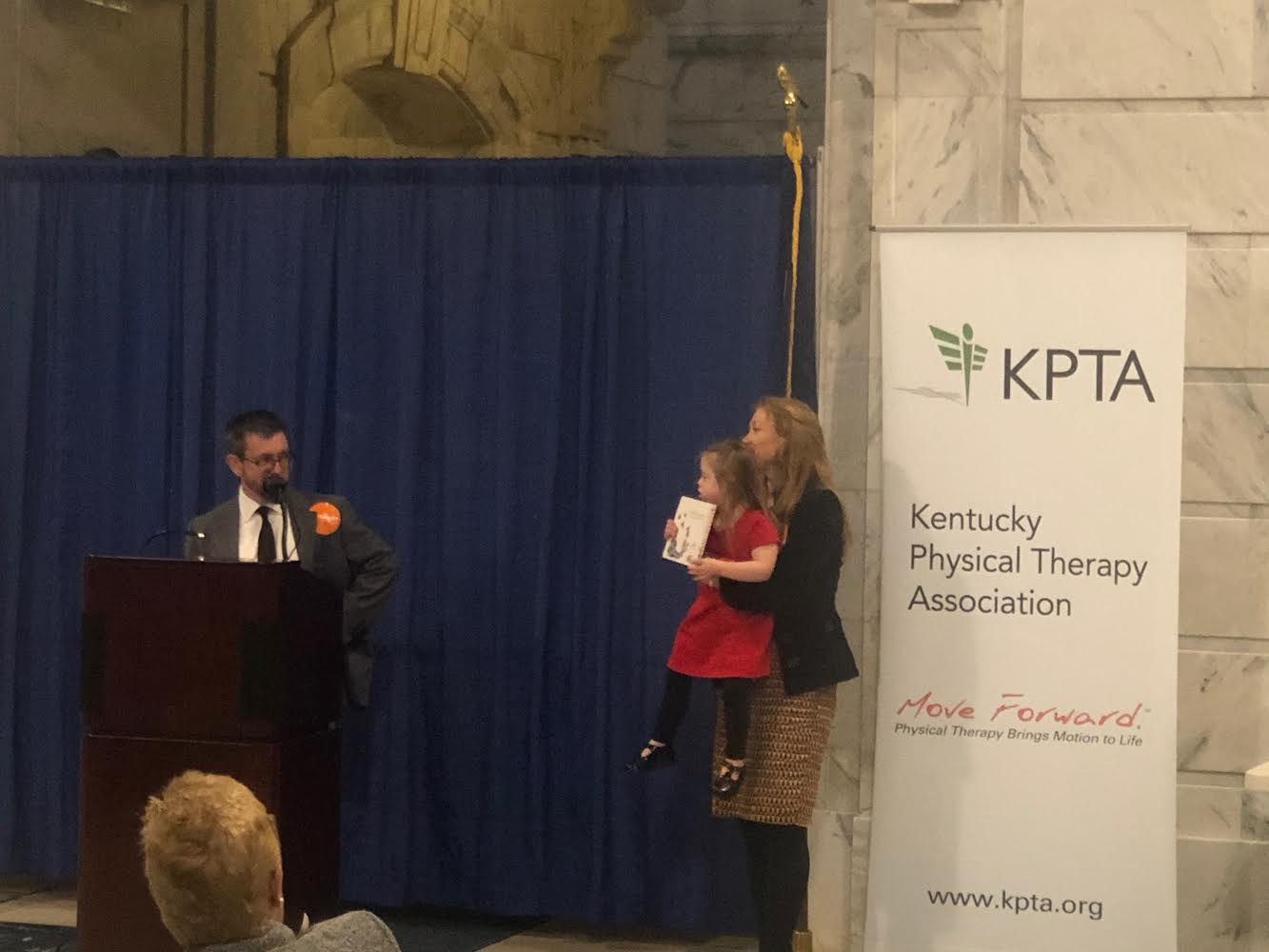Comments made at the Kentucky Physical Therapy Association day at the Capitol
By DSL Dad and Board Member, Danny Slaton

My name is Danny Slaton. Up here with me is my wife Elizabeth Fitzgibbons, and our daughter Lila Slaton, who has Down Syndrome. Lila has an older brother named Henry, and he also is her very favorite person on this planet.
Before Lila was born, everything I knew about physical therapy, about occupational therapy, and about speech therapy was from the perspective of a professional advocate—someone who spends their days in Frankfort. I’d learned a lot about your practice acts, about payment models, about regulatory agencies. But I never had direct experience with any therapies.
That all changed the day Lila was born. She was born in the fall of 2015, on the way to the hospital, in the front passenger seat of the same Subaru Forester that Elizabeth drove here today. It’s a wild story that is still hard to believe we all lived through. But quickly, we learned it wasn’t the biggest news that day. The biggest news to us was the fact that our new beautiful baby girl had Down Syndrome. We were scared and in a sort of shock – but we were also in love right away.
Leaving the hospital, going home, starting our lives together, we felt unmoored. We constantly felt behind, like every minute we weren’t experts in Down Syndrome was a personal failure.
But everything was brand new to us. We heard words like hypotonia and had no idea what that was. We learned about ASD – the atrial septal defect, the type of small defect in Lila’s heart. These were situations and conditions we’d never heard of.
All we wanted to do was love her and take care of her, but we honestly felt inadequate because there was so much we didn’t know.
Then we started meeting therapists. Dr. Beth Ennis at Bellarmine brought Lila to her Pediatric Physical Therapy Clinic in her first weeks home from the hospital. Suddenly it wasn’t about what we needed to know already. It was about what Lila and Elizabeth and I needed to learn together. About how her metabolism was slower than typical kids, and that low muscle tone meant she needed to work harder than some kids to cross milestones like holding her head up, or crawling, or walking.
Dr. Beth also welcomed our parents to join us with Lila at the clinic – and we started to build the support around Lila that included her family so that everyone who cared for her was in the loop on what muscle group we were working on that week, what exercises were best at any given moment in her development.
Through the First Steps program, we worked with Lauren Thomas, an amazing Louisville-based physical therapist – she worked so hard with Lila, and helped guide her development from crawling to standing to walking to running like a maniac. She would treat Lila at home, at a grandparent’s house, at daycare.
The next therapist we met was Sally Sanders, a veteran Speech therapist at the Kids Center in Louisville. Ms. Sally is a wealth of knowledge and experience, and she was a critical resource to us throughout the first few years of Lila’s life. Sometimes the highlight of the week was spending a morning with Ms. Sally, working on strategies for eating and working on moving food around with her tongue, or promoting communication through sign language.
When we talked about going to see a speech therapist during Lila’s first year, at first I didn’t understand. She wasn’t talking yet, but typical kids didn’t talk at that age. I didn’t really understand what a speech language pathologist does. But Ms. Sally taught us about developing the best muscle tone in the tongue and mouth muscles to promote speech later in life, and to do that work and exercise through eating specific food textures. She encouraged us to try foods with Lila that we’d never had thought of, and specifically so that she would get that balance of nutrition and working the right muscles in her mouth.
Dawn Guy, a Developmental Interventionist from Down Syndrome of Louisville, was also part of Lila’s First Steps team. Full disclosure, I serve of the Board of Down Syndrome and encourage all of you to volunteer there and see the incredible programs we have for our members.
Today, Lila is a fearless 4 year old. She’s in a Preschool Class at Sproutlings, a pediatric day care center in Louisville. One of her best friends in her class, Allen Norton, who also has Down Syndrome, could be seen recently conducting the UofL marching band at a football game.
Today, Lila still sees a physical therapist, an occupational therapist and a speech therapist. And we’re working on different strategies to meet Lila where she is today, and where we want her to be.
Our current team:
McKenzie Sexton, a speech therapist at the Kids Center Louisville.
Kristen Brents, Physical Therapist at Open Arms Clinic at Home of the Innocents.
Alicia Edmiston, Occupational Therapist at Open Arms as well.
Lila started Occupational Therapy when she was three, with Alicia at Open Arms. We began working on Lila’s fine motor skills, learning how to hold paint brushes and pencils and markers in a way that later on promotes handwriting. One week we’ll try pinching something new, or pushing small objects through a new texture, and I’ll think, this is going to take a few months to master. But we’ll do the work Alicia gives us, and then Lila will surprise us by leaping ahead with her ability.
We all want to be really good at our jobs – including me. And Elizabeth and I want to do the very best to take care of Lila. But we’re not physical therapists, or occupational therapists, or speech therapists. So we depend on the professionals. The three therapies represented here today are a resource that fills in where parents like us lack that scientific knowledge of how the body mechanics work, how muscles grow or deteriorate. How brain development interacts with fine and gross motor development.
We will work with different therapists over Lila’s life and development – different ages and stages of her development will require different expertise. But we are so lucky to have such tremendous access to therapists across all three practices. I’m excited to see so many students here, students who one day can offer the parents of another Lila the same confidence, the same calming guidance that we felt.
Elizabeth often refers to Lila’s therapists as our ‘bonus family.’ Like Lila has some gravitational pull that keeps pulling amazing people into our lives. People who love what they do and love the people they help. Maybe one day one of you will be in our bonus family. Or you’ll be a hero for some other family.
Either way, stay involved with your profession, advocate for your profession. Come to Frankfort when it counts, and get to know your legislators. They represent you, and they value your voices.


